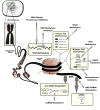Epigenetic interventions for epileptogenesis: A new frontier for curing epilepsy
- PMID: 28279785
- PMCID: PMC5565684
- DOI: 10.1016/j.pharmthera.2017.03.002
Epigenetic interventions for epileptogenesis: A new frontier for curing epilepsy
Abstract
This article highlights the emerging therapeutic potential of specific epigenetic modulators as promising antiepileptogenic or disease-modifying agents for curing epilepsy. Currently, there is an unmet need for antiepileptogenic agents that truly prevent the development of epilepsy in people at risk. There is strong evidence that epigenetic signaling, which exerts high fidelity regulation of gene expression, plays a crucial role in the pathophysiology of epileptogenesis and chronic epilepsy. These modifications are not hard-wired into the genome and are constantly reprogrammed by environmental influences. The potential epigenetic mechanisms, including histone modifications, DNA methylation, microRNA-based transcriptional control, and bromodomain reading activity, can drastically alter the neuronal gene expression profile by exerting their summative effects in a coordinated fashion. Such an epigenetic intervention appears more rational strategy for preventing epilepsy because it targets the primary pathway that initially triggers the numerous downstream cellular and molecular events mediating epileptogenesis. Among currently approved epigenetic drugs, the majority are anticancer drugs with well-established profiles in clinical trials and practice. Evidence from preclinical studies supports the premise that these drugs may be applied to a wide range of brain disorders. Targeting histone deacetylation by inhibiting histone deacetylase enzymes appears to be one promising epigenetic therapy since certain inhibitors have been shown to prevent epileptogenesis in animal models. However, developing neuronal specific epigenetic modulators requires rational, pathophysiology-based optimization to efficiently intercept the upstream pathways in epileptogenesis. Overall, epigenetic agents have been well positioned as new frontier tools towards the national goal of curing epilepsy.
Keywords: DNA methylation; Epigenetics; Epilepsy; Epileptogenesis; Histone modification; miRNA.
Copyright © 2017 Elsevier Inc. All rights reserved.
Conflict of interest statement
Figures



References
-
- Amir RE, Van den Veyver IB, Wan M, Tran CQ, Francke U, Zoghbi HY. Rett syndrome is caused by mutations in X-linked MECP2, encoding methyl-CpG-binding protein 2. Nat Genetics. 1999;23:185–188. - PubMed
-
- Agis-Balboa RC, Pavelka Z, Kerimoglu C, Fischer A. Loss of HDAC5 impairs memory function: implications for Alzheimer’s disease. J Alzheimer’s Dis. 2013;33:35–44. - PubMed
-
- Albertson TE, Joy RM, Stark LG. A pharmacological study in the kindling model of epilepsy. Neuropharmacol. 1984;23:1117–1123. - PubMed
Publication types
MeSH terms
Substances
Grants and funding
LinkOut - more resources
Full Text Sources
Other Literature Sources
Medical

